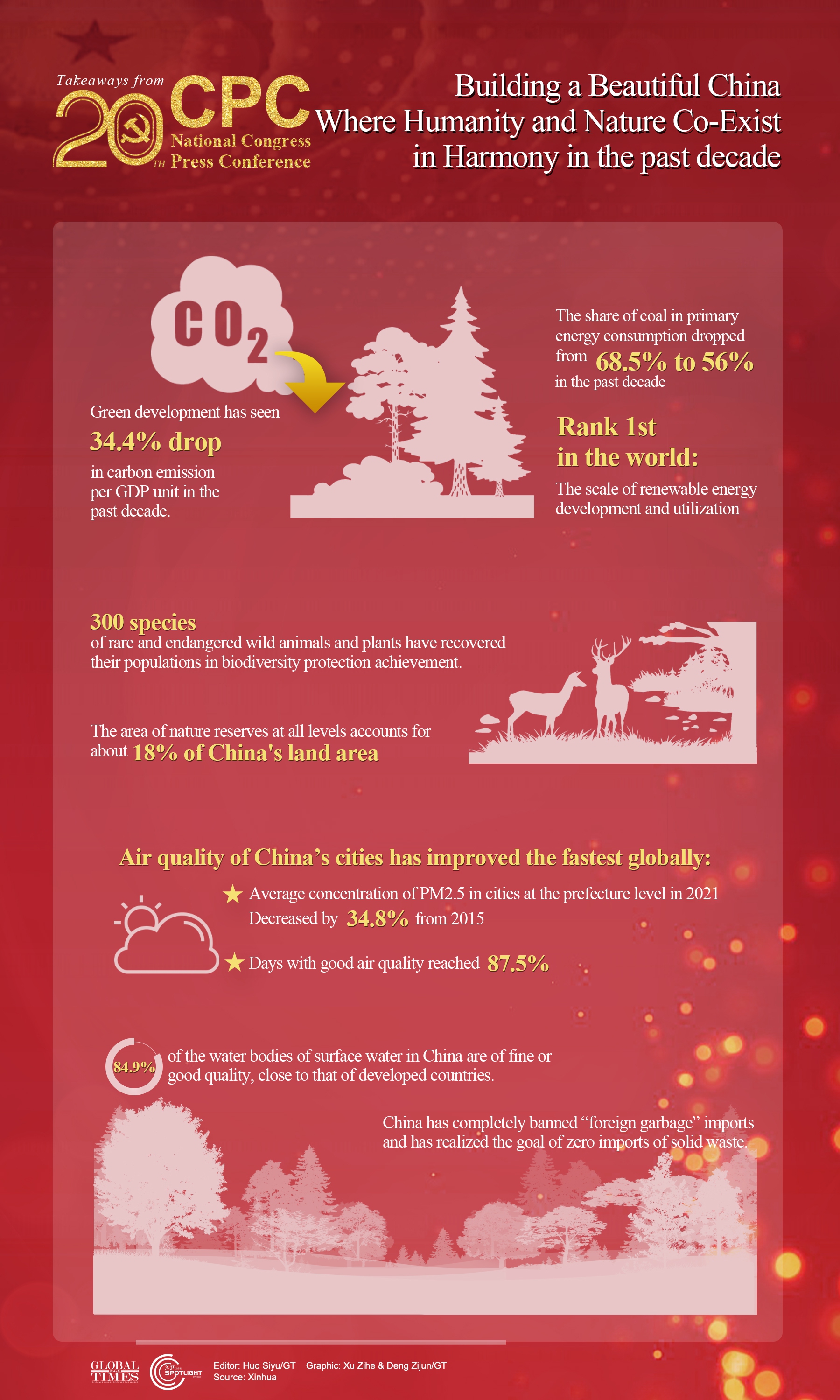China’s environmental ideal, efforts contribute to global climate governance: official

Photo: Xinhua
Chinese achievements in pollution control, ecological recovery and protection, and green development China has made in the past decade were highlighted at a Friday press briefing on sideline of the 20th National Congress of the Communist Party of China (CPC), where a senior official pointed out China's participation and leadership in global climate governance.
According to the press briefing, China has been the fastest in improving air quality and the PM2.5 level in cities at the prefecture level and above dropped by 34.8 percent from that of 2015. Days with good air quality reached 87.5 percent.
Pollution of water bodies and the soil is also effectively tackled, Zhai Qing, vice minister of the Ministry of Ecology and Environment and a deputy to the Congress, said at the press briefing.
Ecological systems are protected and restored. National parks are set and more than 300 endangered animal and plant species saw their wild populations recover, marking achievements in protecting ecological diversity, Zhai said.
Zhai also said green development has made firm steps forward. Carbon peak and neutrality goals are written in development plans. In 2021, the country's carbon emission per GDP unit dropped 34.4 percent from 2012 level.
"Lucid water and lush mountains are invaluable assets" has been deeply embedded in China's development, he said.
Zhai also introduced cases where the law enforcement was enhanced on violations.

Reporters are seen at the press center for the 20th National Congress of the CPC, where a briefing was held on October 21. Zhai Qing, vice minister of the Ministry of Ecology and Environment, spoke with journalists under the theme of “Building a beautiful China with harmonious coexistence between man and nature.” Photo: Li Hao/GT
More than 4,600 law enforcers walked more than 180,000 kilometers and detected 60,292 emission spots along the mainstream and nine major tributaries of the Yangtze basin, 30 times of the number local officials previously acquired. Acquiring knowledge of the situation facilitated relevant supervision and problem-solving.
Twenty-three people faced criminal penalties in two cases of fabricating environmental data, the first of its kind. New methods including drones and satellites are used to assist the identification of problems.
China has also fulfilled more than it had pledged to the international community on carbon reduction, according to Zhai, citing data on use of clean energy and forestation.

Building a Beautiful China Where Humanity and Nature Co-Exist in Harmony in the past decade.Editor: Huo Siyu/GT.Graphic: Xu Zihe/GT
Ma Jun, director of the Beijing-based Institute of Public and Environmental Affairs, said through efforts in pollution control and ecological protection in the past decade, China has basically reversed the trend of environmental degradation.
The bald carbon reduction goals, which prompted more countries to follow suit, suggested that China has developed from a participator to a leader in climate governance, Ma said.
The expert also pointed out when the world faces three major crises — COVID-19, energy and geopolitical rivalry — global climate cooperation is facing great challenges and risks of retrogression.
At such critical time, China, as one of the major economies, upholding its climate promises and ecological ideal will be essential for the world's pursuit of better coping with the climate change, Ma noted.
China's environmental aspiration was defined as building a beautiful China where humanity and nature co-Exist in harmony at the ongoing Party National Congress.
Zhai said at the press briefing that China upholds multilateralism and the principle of common but differentiated responsibilities and respective capabilities, adding that the country has promoted the signature, entry into force, and implementation of the Paris Agreement.
The country has taken an active part in South-South cooperation on climate change. It has done its best to help other developing countries, especially small island countries, African countries, and the least-developed countries, to improve their climate response capacity to reduce the adverse impacts of climate change, said Zhai.
China has allocated more than 1.2 billion yuan ($160 million) to South-South cooperation on climate change, signed 43 South-South cooperation documents with 38 developing countries, and trained about 2,000 officials and experts in the field of climate change for more than 120 developing countries, according to official data revealed previously.
Heading forward, China will work with all parties to actively participate in the global governance of climate change, Zhai said.

